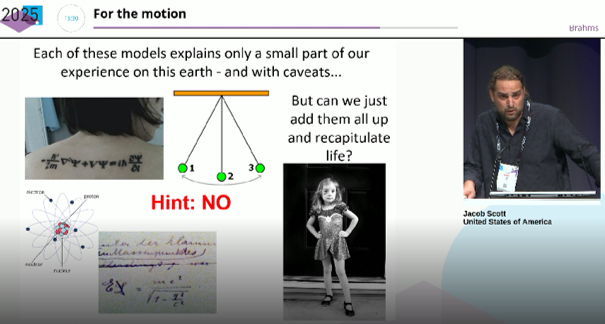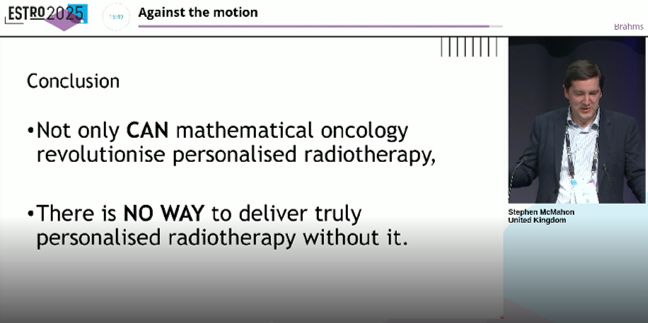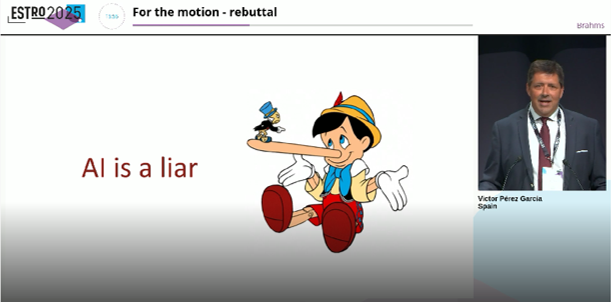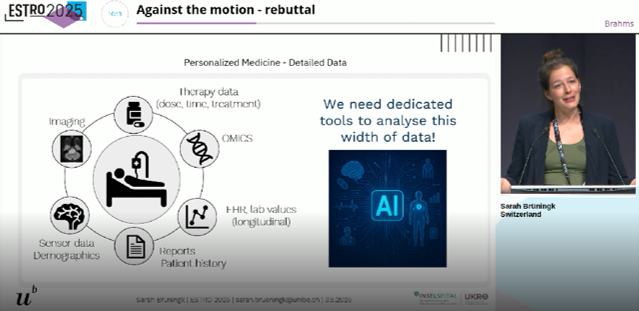ESTRO 2025 Congress Report I Radiobiology Track
Chairs: Laure Marignol, Antje Dietrich
Speakers: Jacob Scott, Stephen McMahon, Victor Pérez Garcia, Sarah Brüningk
An engaging debate on mathematical oncology and artificial intelligence (AI) took place at ESTRO 2025. Before the debate began, a packed room was invited to vote either for or against the motion. The poll found that 46% of the audience voted in favour of the motion – namely, that the capacity for mathematical oncology and AI to revolutionise personalised medicine is an overhyped promise - while 54% voted against.

The debate was opened by Jacob Scott, speaking in favour of the motion. Mathematical oncology aims to describe the rules governing cancer. These are models designed to capture complex phenomena; however, they rely on frameworks we define to interpret complex biological phenomena, rather than replicating nature’s exact rules. As George Box famously stated, “All models are wrong, but some are useful,” and, as Einstein once remarked, “Models should be as simple as possible, but not simpler”, otherwise, they fail to capture the truth. Cancer represents a breakdown of the covenant of multicellularity. We still lack a sufficiently rigorous understanding of cellular physiology to describe it fully; cancer violates these principles, and AI-based predictions can be dangerously inaccurate when built on incomplete or oversimplified assumptions.
Stephen McMahon argued against the motion, stating that there are three incontrovertible truths supporting his position. (1) Cancer is characterised by heterogeneity, and targeting this heterogeneity would revolutionise radiotherapy; (2) The use of simple markers is not feasible due to the underlying biological complexity of this heterogeneity; (3) The only way to integrate and address this complexity is through mathematics. To conclude, mathematical oncology is not just a promising tool – it is the cornerstone of personalised radiotherapy. Without it, the concept of truly individualised treatment remains out of reach.

Victor Pérez Garcia delivered a rebuttal in support of the motion. He pointed out that AI and mathematical oncology are fundamentally different fields. Mathematical oncology aims to build models to better understand biological processes. AI, by contrast, may be useful for certain technical tasks such as automatic segmentation and contouring, but it is not suited to advancing personalised medicine. AI relies on datasets that are often unattainably large in the medical field and tends to struggle with interpretability. Crucially, the data it analyzes may lack the key information required to support clinical decision making, leading to a high risk of erroneous conclusions. Like AI, mathematical oncology can also be overhyped. In many cases, its promises exceed its actual capabilities. Most mathematical models are wrong, especially those that are either too simplistic or overly complex. Yet, when a model strikes the right balance and succeeds in capturing the relevant biological dynamics, that’s when the true potential of mathematical oncology may be revealed.

The rebuttal against the motion was presented by Sarah Brüningk, who encouraged the audience to remain enthusiastic about AI, mathematical oncology, and the potential these technologies hold for our patients-particularly in the context of personalised medicine. She emphasised that the key issue is not whether mathematical oncology and AI are already revolutionising cancer therapy today, but rather what they are likely to achieve in the near future. The large volume of data that must be analysed for personalised medicine requires dedicated tools-and AI is one of them. AI has already transformed many aspects of our daily lives. If a similar revolution has not yet occurred in clinical practice, this is largely due to the current limitations in available data. However, it is hoped that this barrier will be overcome in the future. AI should not be considered overhyped simply because its full potential has not yet been realised.

At the end of the debate, the vote was repeated: 41% of the audience were in favour of the motion, while 59% were against it.
-Copia-F.jpg.aspx?width=250&height=380)
Monica Mangoni
Chair of the ESTRO 2025 Radiobiology Track
Radiation Oncologist
University of Florence
Florence, Italy